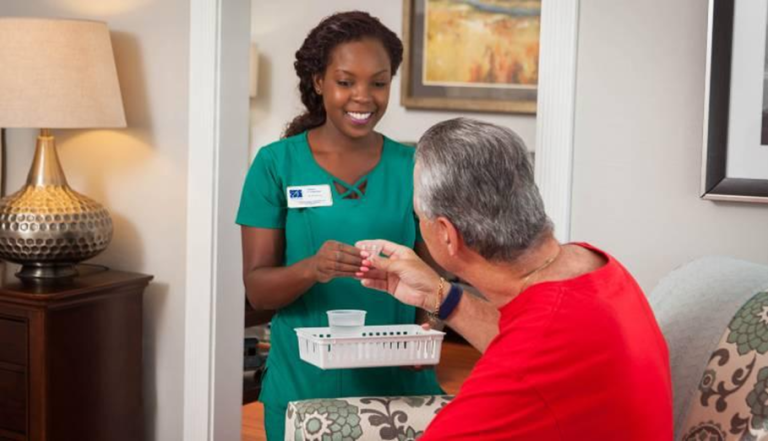Healing doesn’t have to mean nursing home care. By bringing licensed nurses into the convenience of home, families can combine clinical excellence with the routine, the relationships, and the surroundings which make for more rapid recuperation and peace of mind. The familiar surroundings also diminish anxiety in the patients, thus stimulating an interest in their own care. It maintains privacy and honors preferences that might be difficult to comply with in an institution. Skilled nursing care in a home atmosphere combines medical aptitude with necessary avocations, making for patient propriety and family centeredness.
What Is Skilled Nursing Care?
Skilled nursing care is clinical, physician directed and coordinated support in the home provided by licensed nurses. This means far more than assistance with bathing or food. It is all-embracing of evaluations, interventions and education that necessitate special training. Everything about the case: medication schedules and mobility objectives, etc., will be individually oriented as to the patient’s diagnosis, lifestyle and tastes. Also delivered by nurses will be matters relative to equipment delivery and utilization, safe use of walkers, glucometers and oxygen etc.
Check out https://www.investopedia.com/terms/s/skilled-nursing-facility.asp to know the difference from the nursing facilities.
Nursing care will form the transition from institutional care to independence and teaches safe medication practices, mobility techniques, symptom awareness in safe settings etc. while promoting through realistic goals at each patient visit. Guided by an individually attuned plan of care, the nurses watch symptoms, conferring with prescribing physicians and asking for timely modifications when required.
After surgical or serious illness this transition training goes a long way to teach the patients safe medication modalities, safe mobility techniques and symptom awareness and expression all in a timely fashion with due respect to the individual nature of each rehabilitation.
Common Medical Tasks Handled at Home
An astonishing variety of hospital-level services can be safely accomplished in the living room or bedroom. With the right equipment, the right supplies, and a clear plan of care, nurses make focused visits that accelerate recovery and build confidence in self-care.
When appropriate, clinicians demonstrate tasks with a caregiver present and follow these demonstrations with return demonstrations to assure competence. A number of agencies are now supplementing visits at the bedside with secure remote-monitoring equipment that alerts clinicians to changes in patients’ vital signs between visits and makes it possible for changes of condition to be met in a timely way.
- Dressing changes and complex wound assessments
- Intravenous therapy, injections, and central-line management
- Catheter and ostomy management. Read more here
- Cardiac, respiratory, and blood glucose monitoring
- Education in chronic disease management such as diabetes, chronic obstructive pulmonary disease, and heart failure
- Fall prevention evaluations and hands-on coaching for patient and family on safety in the home
Who Provides Skilled Nursing?

Registered nurses (RNs) and licensed vocational or practical nurses (LVNs/PNs) work under physician orders and in concert with therapists and social workers as necessary. These interdisciplinary teams provide specialized home care services that recognize each person’s aims while remaining tightly related to the plan of medicine.
Continuous professional education keeps clinician’s current with new developments concerning best practices, emerging treatments, and evolving technology. Families can expect caregivers with background checks, state licenses in good standing, and detailed recordings of each encounter. Common-sense language teaching and open lines of communication ensure that family members grasp each turn of the road.
This collaborative approach enables seniors and individuals to develop the new skills at a comfortable timetable without sacrificing clinical oversight.
Why Families Choose In-Home Nursing
Given where people live, care given on site is in better accord with individual time schedules, reduces tensions, keeps them near loved ones. For caregivers balancing work and family, professional supervision at home maintains point-by-point routines, while attending to their medical requirements. This continuity allows families to project working time and appointments about life without losing oversight.
- Early recognition of alternations in symptoms, with provision of lower risk of emergency visits and readmissions
- Greater adherence to therapeutic regimen because interventions take place in familiar surroundings
- Clarity and uniformity in education, so that everybody clearly understands medications, equipment, and steps to follow
- A voiding of transport problems, lower costs
- Long-lasting relationships, same clinicians visit same patients’ week by week
Safety and Peace of Mind
In security, is the overall basis for skilled nursing care at home. Nurses check orders, verify patient identity and pursue rigorous protocols for administering medications. Strong infection control procedures ranging from proper mass hygiene to sterilization protocols provide patients needing increased rescue increased security.
Agencies support 24-hour triage and rapid escalation options, including telehealth or remote monitoring to recognize subtle changes at an early juncture. Families are taught the fundamentals of infection control, recognize red flag symptoms and rehearse emergency plans, so as to know how to react if shifts in medical conditions occur. This collaborative vigilance provides ensure that always quality medical treatment and compassionate care are immediately at hand.

